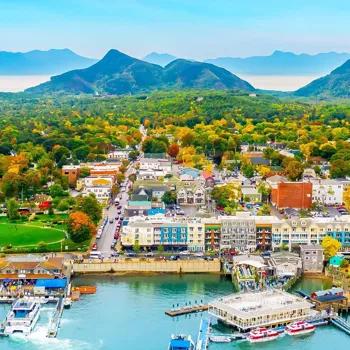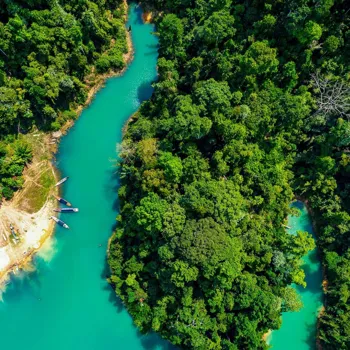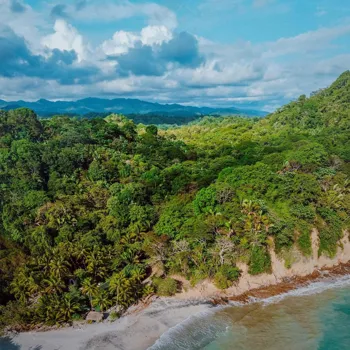Discover how to travel responsibly & make a positive impact on your journey. Learn 10 tips to create lasting memories
Travelling is a fantastic way to see the world, experience new cultures, and create
lasting memories. But, it's also important to remember that our travels can have a big impact on the places we visit and the people who live there.

Responsible travel is about making conscious choices that minimise negative impacts and maximise positive contributions. It's about respecting the environment, supporting local communities, and being mindful of cultural differences.
So, before you pack your bags for your next adventure, consider these 10 tips to travel responsibly and make a genuine difference on your journey.
Pack Light and Smart:
Before you even leave your house, you can start practicing responsible travel by packing efficiently. Think about it: the heavier your luggage, the more fuel the plane needs, contributing to higher carbon emissions. Opt for lightweight luggage and pack only the essentials.
Consider versatile clothing items that can be mixed and matched, reducing the number of outfits you need to bring. Another great tip is to choose travel sized toiletries or, even better, invest in reusable travel containers that you can refill.
This not only saves space but also reduces plastic waste. Instead of buying new travel gear, see if you can borrow items from friends or family. Sometimes a simple travel pillow or a sturdy backpack is all you need. Packing light also makes getting around easier on your destination.
You're less burdened and more agile which means you can easily switch from a metro system, auto rickshaw, and cycle.
Reduce, Reuse, and Refill:
Plastic pollution is a major problem worldwide, and tourism often exacerbates it. Make a conscious effort to reduce your plastic consumption while travelling. Invest in a reusable water bottle and refill it whenever possible. Many airports and hotels now have water refill stations.
Carry your own reusable shopping bag for groceries or souvenirs. Politely decline plastic straws, cutlery ,and shopping bags whenever offered. When buying snacks or drinks, choose options with minimal packaging.
Consider purchasing solid shampoo and conditioner bars to eliminate plastic bottles altogether. These simple steps can significantly reduce your plastic footprint and help protect the environment. Don’t just bring reusable items – actually use them!
It's a habit that takes practice but makes a huge impact. Remember to clean your reusable containers regularly to maintain hygiene.
Support Local Businesses:
One of the best ways to contribute to the local economy is by supporting local businesses. Instead of staying at international chain hotels, consider staying at locally owned guesthouses or homestays. You will often have a more authentic experience and directly support local families.

Eat at local restaurants and sample regional cuisine. Visit local markets and shops to buy souvenirs and handicrafts. Not only are you supporting local artisans and vendors, but you are also getting unique, handcrafted items that reflect the culture of the place you are visiting.
Seek out small family run enterprises for activities such as trekking, sightseeing or boat safaris. By spending your money locally, you are helping to create jobs, boost the local economy, and ensure that tourism benefits the people who live there.
Also, if you book direct with the small companies sometimes you get a better deal.
Respect Local Culture and Customs:
Before you travel to a new place, take the time to research local culture and customs. Learn a few basic phrases in the local language. Be aware of local dress codes and etiquette, especially when visiting religious sites. Ask permission before taking photos of people.
Avoid loud and disruptive behaviour that may offend locals. When interacting with locals, be respectful and open-minded. Remember that you are a guest in their country, and it is important to show respect for their way of life. Engaging with locals with kindness is always a good idea.
Understand how their culture differs from yours. If you hire a local guide, it helps them earn a living and provides you with a unique insight into their culture. It's important not to take photographs where it is disrespectful to do so .
Conserve Water and Energy:
Water and energy are precious resources and it is important to use them wisely, especially in areas where they are scarce. Take short showers and turn off the tap while brushing your teeth. Turn off lights and air conditioning when you leave your hotel room.

Choose eco-friendly accommodations that have implemented water and energy-saving measures. Be mindful of your water usage when washing clothes. Consider hand washing small items instead of using the hotel laundry service.
By conserving water and energy, you are helping to protect the environment and reduce your impact on local resources. Also, when out on treks and walks be very aware of the water sources – avoid using soaps in them and avoid leaving any sign of your presence. Conserving water means that other in the community have enough water to drink and sanitation
Choose Eco-Friendly Transportation:
Whenever possible, choose eco-friendly transportation options. Walk, cycle, or use public transportation to get around. These are cleaner alternatives that will also allow you to explore the area up close. If you need to travel long distances, consider taking a train or bus instead of flying.

Air travel has a significant carbon footprint, so reduce your flying whenever you can. If you do need to fly, consider offsetting your carbon emissions through a reputable carbon offset program. Within the cities also, explore to take local transport options rather those that are for tourists.
This might be local buses, cycle rickshaws, or taking the underground metro. Hiring electronic scooters is good for traveling shorter distances. Travel in groups where possible. It will reduce the number of vehicles.
Be Mindful of Souvenirs:
Think twice about buying souvenirs made from endangered species or those that exploit local communities. Avoid purchasing items made from animal products like ivory, coral, or shells. Look for souvenirs that are locally made and ethically sourced.
Support artisans who use sustainable materials and practices. Buying directly from local artisans ensures that they receive a fair price for their work. Consider buying experiences instead of material items.
Taking a cooking class, going on a guided tour, or attending a local festival are all great ways to support the local economy and create lasting memories. Ask where the items are sourced and if local communities get income.
Avoid bartering agressively as sometimes what seems like a small amount to us is a big amount to them.
Leave No Trace:
Practice the principle of "Leave No Trace" wherever you go. Pack out everything you pack in, including trash, food scraps, and wrappers. Dispose of waste properly in designated bins. Avoid littering in natural areas. Stay on marked trails to avoid damaging vegetation.
Do no disturb or take any souvenirs from historical and archaeological sites. Respect wildlife and their habitats. Don't feed animals or disturb their natural behaviour. By leaving no trace, you are helping to preserve the environment for future generations.
Always reduce, reuse, recycle wherever you are and be respectful to the environment surrounding you. Educate your friends and family. A small wrapper left behind can cause multiple problems.
Volunteer Responsibly:
Volunteering can be a great way to give back to the communities you visit. However, it is important to choose volunteer opportunities carefully and ensure that they are ethical and sustainable.

Research organizations thoroughly to ensure that they are reputable and have a positive impact on the community. Avoid volunteering in orphanages or other institutions that may exploit vulnerable children. Choose volunteer opportunities that align with your skills and interests.
Be prepared to work hard and respect the local culture. Remember that you are there to assist the community, not to impose your own views or ideas. Be realistic in your expectations. You may not be able to solve all the problems, but your contribution can still make a difference.
Educate Yourself and Others:
The more you know about responsible travel, the better equipped you will be to make sustainable choices. Read books, articles, and blogs about sustainable tourism. Talk to other travellers and share your experiences. Encourage your friends and family to travel responsibly as well.

By educating yourself and others, you can help to create a more sustainable and responsible tourism industry. Be aware of local news. Talk with locals to understand the issues they face. It is always important to educate others about being responsible when they travel.
Start sharing your experiences on social media using the appropriate hashtags to encourage other travellers to do the same. Together, we can all make a difference.
AI Generated Content. Glance/InMobi shall have no liability for the content

















